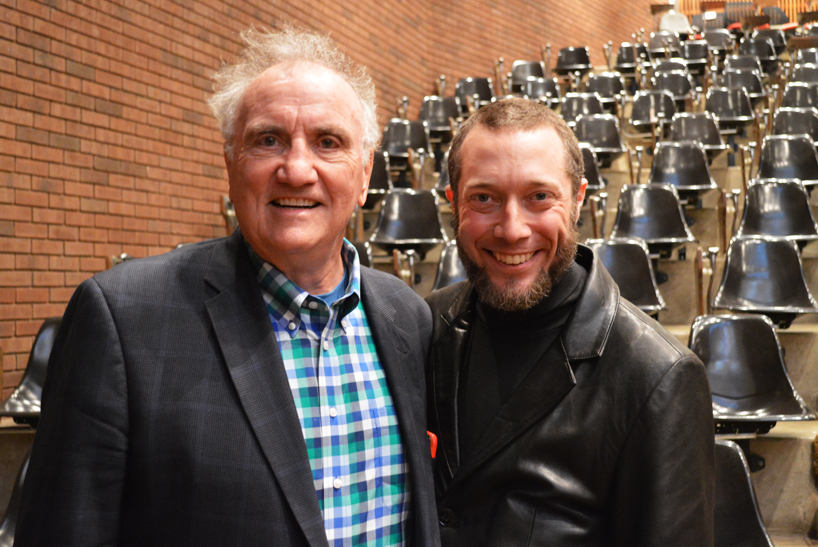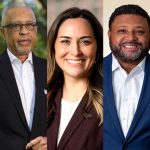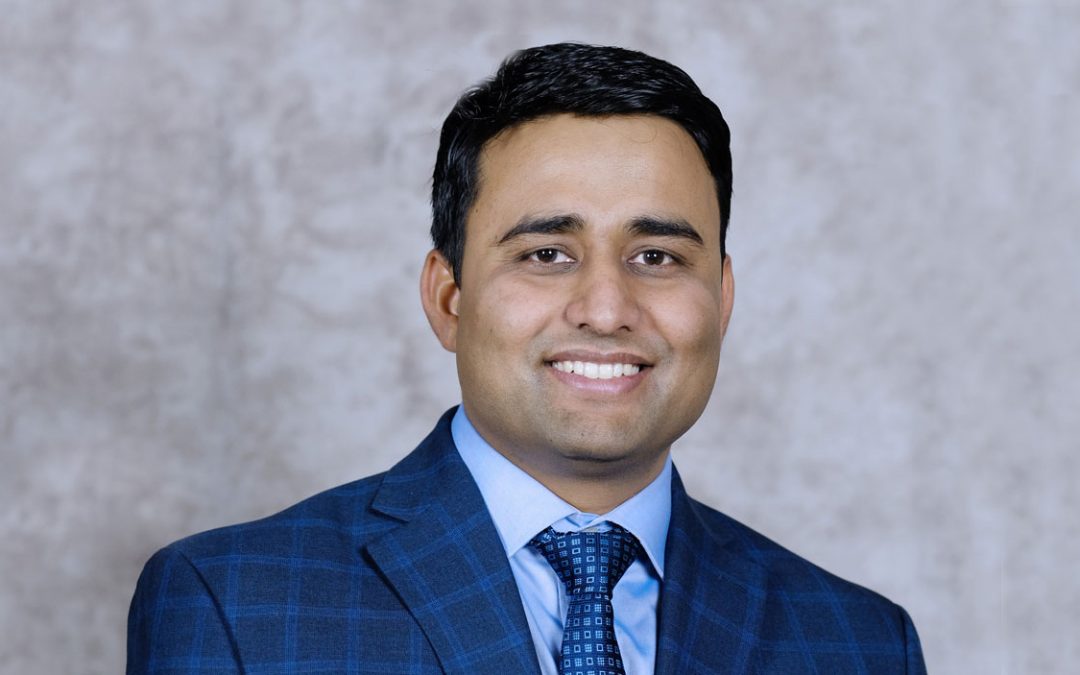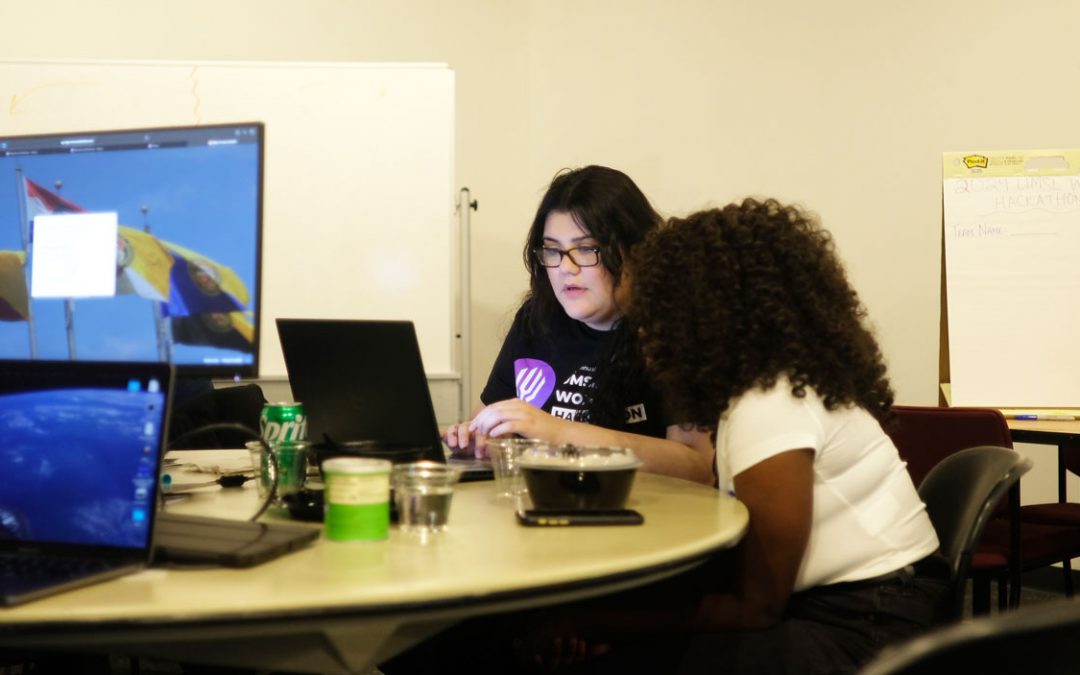
For Associate Professor of Linguistics Benjamin Torbert (at right), introducing Walt Wolfram to UMSL students last week was a special treat. Wolfram, the William C. Friday Distinguished University Professor at North Carolina State University, had a critical impact on Torbert’s own life and scholarship years ago. (Photo by Evie Hemphill)
Liz Miller and her classmates in English 5800 have been digging into the intersections of dialect, stigma and discrimination all semester. But that focus impacted her in a new way last week when one of the authors they’d been reading – Walt Wolfram – showed up in person.
“It was great to put a face and a voice to everything we’ve been studying,” said Miller, who is wrapping up her master’s degree with emphases in rhetoric and gender studies at the University of Missouri–St. Louis this spring. “I really appreciate that he showed us concrete examples of what [linguistic diversity] has looked like at his university. It gives me hope that we can all do better.”
Although Wolfram, who leads the Language and Life Project at North Carolina State University and has devoted about 50 years to researching social and ethnic dialects, was only in St. Louis for one day, Miller and fellow campus community members had ample opportunity to interact with him during the April 6 visit.
“One reason that I invited Dr. Wolfram is that this is the first semester I’ve taught a graduate course and an undergraduate course in my specialty at the same time,” said UMSL linguist Benjamin Torbert, a Department of English faculty member and former student of Wolfram’s. “So I thought we could get him in front of the undergrads in the afternoon and the grads in the evening.”
Torbert also opened the educational events up to the public, and the afternoon showing of the Life and Language Project’s brand new film “Talking Black in America” drew dozens of interested attendees as well as many questions during the discussion that followed.
The documentary is the result of a three-year, National Science Foundation-funded project that seeks to understand both the history and status of African American speech, which Wolfram has described as “the most controversial and misunderstood variety of speech in America.”
It weaves together wide-ranging interviews – some with everyday people on the street and others with scholars and widely recognized names and faces such as Jeremiah Wright – conducted at locations all across the country. The aim is to challenge common myths and misconceptions about language with a look at the reality and vibrancy of the role language plays in people’s lives.
Jacqueline Carter, a PhD candidate in the College of Education, said afterward that she wasn’t sure what to expect and was pleasantly surprised as an African American woman who has shared some of the experiences of those interviewed in the film.
“I saw a lot of students that were not African American [in attendance], and it’s very important that people are exposed to the information and can go back home and go back to their private spaces and think about what they heard,” Carter said.
Premiering at Wolfram’s home university just three weeks ago, the documentary is his 12th film and is expected to air on TV within the next year.
“PBS is currently reviewing it,” said Wolfram, who is quick to emphasize the collaborative nature of the effort and credits other scholars across the country as co-producers. “We were originally scheduled to have Chris Rock be the narrator, but that didn’t work out. But actually we just heard he wants to see a version of it, so we might yet include Chris Rock in narration and so forth. And so we’re not [totally] done.
“Language is also very controversial, and particular kinds of language of marginalized groups is quite stigmatized,” Wolfram added. “For example, African American speech is not a collection of errors. It’s a very systematic dialect in its own right. … Getting people to appreciate diversity of languages is my primary goal.”
That goal extends to college campuses in some specific and perhaps surprising ways, which he, UMSL graduate students and others discussed later in the day during his presentation titled “Linguistic Inequality and Campus Life.”
“There’s a lot more intolerance and disdain for language differences in higher education than people often recognize,” Wolfram said. “People who can be very progressive about other social issues – be they sex, gender, religion and so forth – are still quite intolerant of language differences.”
That point resonated with Miller, who agreed that there is a need for increased awareness of language discrimination at universities – and particularly in fields she’s personally invested in.
“Many students who speak stigmatized dialects actually feel the pressure and weight of that stigma more in their humanities classes, which are supposed to be representative of the most progressive voices,” Miller said. “Professors in those disciplines don’t necessarily notice linguistic prejudices they might hold, and in any case, the focus on language is heightened in these classes, which means that students might feel the force of stigma more. We all need to work together in these spaces to ensure that linguistic diversity is respected and celebrated.”
Wolfram noted that while most universities have offices of diversity, they “never do language.” That’s become another focus for him lately.
“What we’re doing is showing how language has to be included – but also how language affects other things,” he said. “So for example if you’re going to talk about gender and sex, language intersects with those issues, whether it be sexist terms, the language of sexual consent – all of these things impact on it.”















